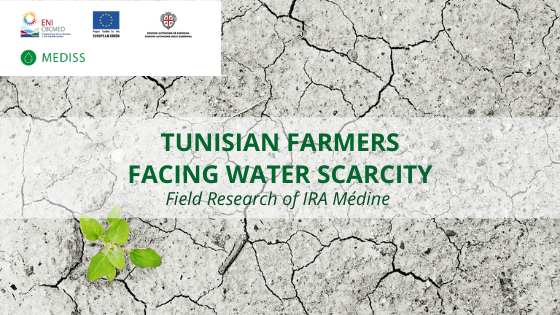[MEDISS] Tunisian farmers facing water scarcity: field research by IRA Médenine on adaptation strategies.

Groundwater scarcity is a growing problem in Tunisia. Irrigation water is becoming an increasingly scarce resource for the agricultural sector in many regions. A common ground in past policy schemes was the development of adequate irrigation infrastructure to guarantee the supply of irrigation water as the demand for agricultural products was increasing.
However, these expansionary policies have resulted in an increase of irrigation water demand at a heavily subsidized cost and led to aquifer overexploitation and groundwater quality deterioration (salinization). Groundwater scarcity has become an increasing social and economic concern for policy makers and private irrigated perimeters in southeastern Tunisia.
The research study Coping with Water Scarcity in Private Irrigated Perimeters: Farmers’ Adjustments in Southeastern Tunisia* carried out by the Institut des Régions Arides (IRA) de Médenine, MEDISS partner, and the Ecole Supérieur d’Agriculture de Mograne (Tunisia) analyzes the different approaches adopted by farmers to cope with the poor water resources management, social and economic factors that affect their choice of methods and the barriers to adaptation.
For this research, a household survey and group discussions were undertaken. A total of 100 households were interviewed in Zeuss-Koutine region (South eastern Tunisia) and a logit model is used to analyse the determinants of farmers’ choice of adaptation strategies. Two strategies were identified:
- strategies may be based on ‘chasing’ groundwater by deepening existing wells or by drilling other wells, so as to maintain a water-intensive farming system;
- strategies that may be designated as adaptive, i.e., adapting the farming system to the water available on-farm given existing hydraulic infrastructures.
Results from the discrete choice model employed indicate that the level of education, age, wealth of the head of household and social capital all influence farmers’ choices. The major barriers include lack of information on adaptation methods and financial constraints.
*Authors:
(1) Mahdi Naceur and (2) Ayoub Fouzai
(1) Institut des Régions Arides de Médenine, Tunisia
(2) Ecole Supérieur d’Agriculture de Mograne, Tunisia
*******
In order to capitalise on and disseminate the know-how of the MEDISS partners, we intend to valorise the scientific research that our partners have carried out in previous projects and that represent an important foundation for our activities.
This work is the result of another former project carried out by the Institut des Régions Arides (IRA) de Médenine: WADIS-MAR Water harvesting and Agricultural techniques in Dry lands: an Integrated and Sustainable model in Maghreb Regions funded by European Commission through Sustainable Water Integrated Management (SWIM) Programme.
Read the full article here:
The International Journal of Water Resources and Arid Environments 9(1): 37-45, 2020
ISSN 2079-7079
© PSIPW, 2020









